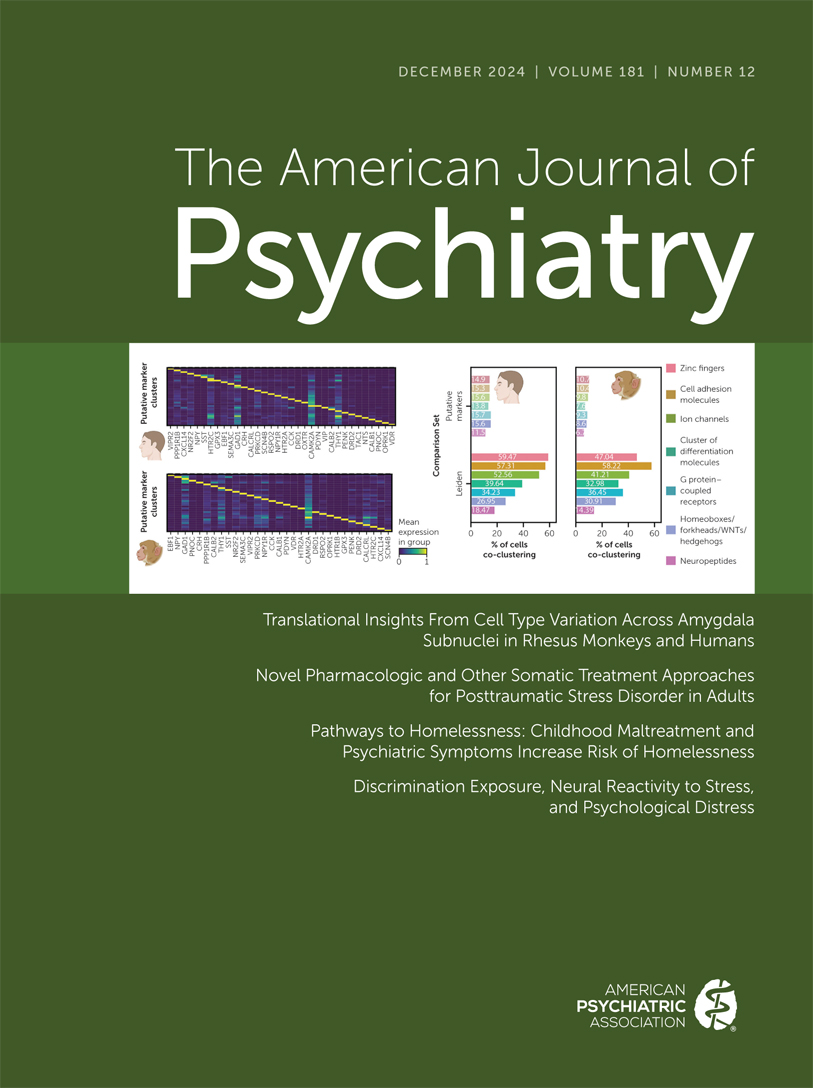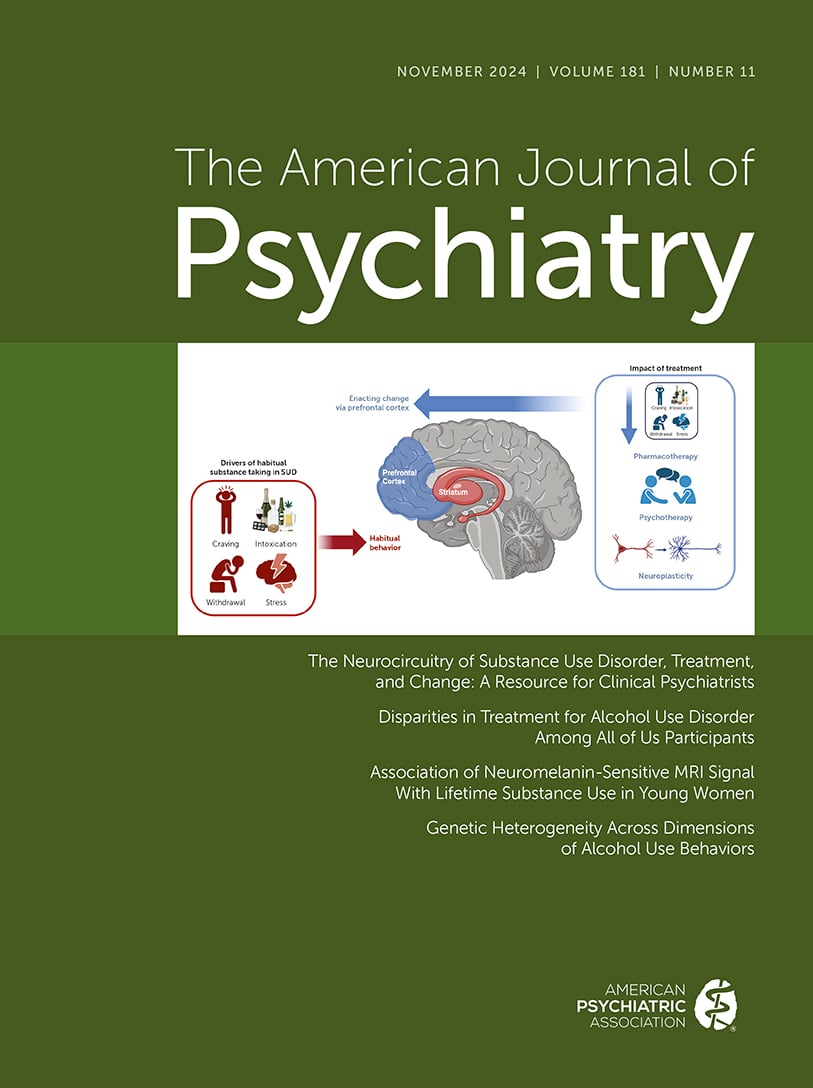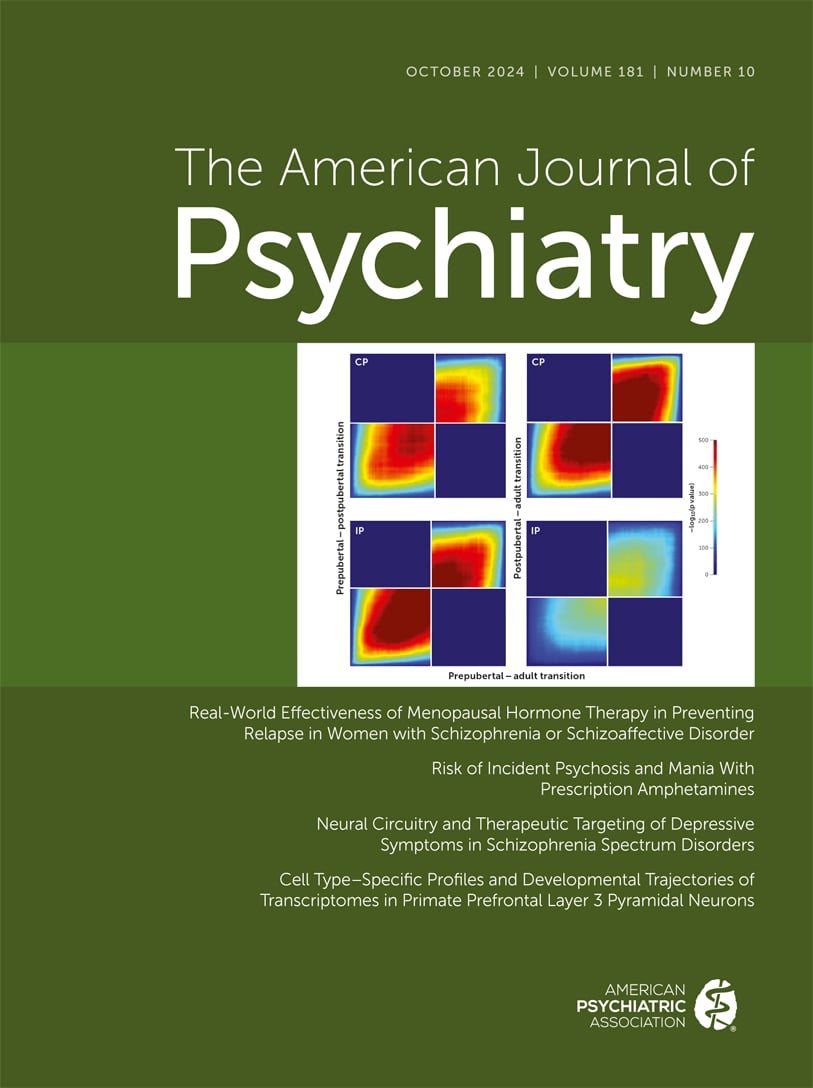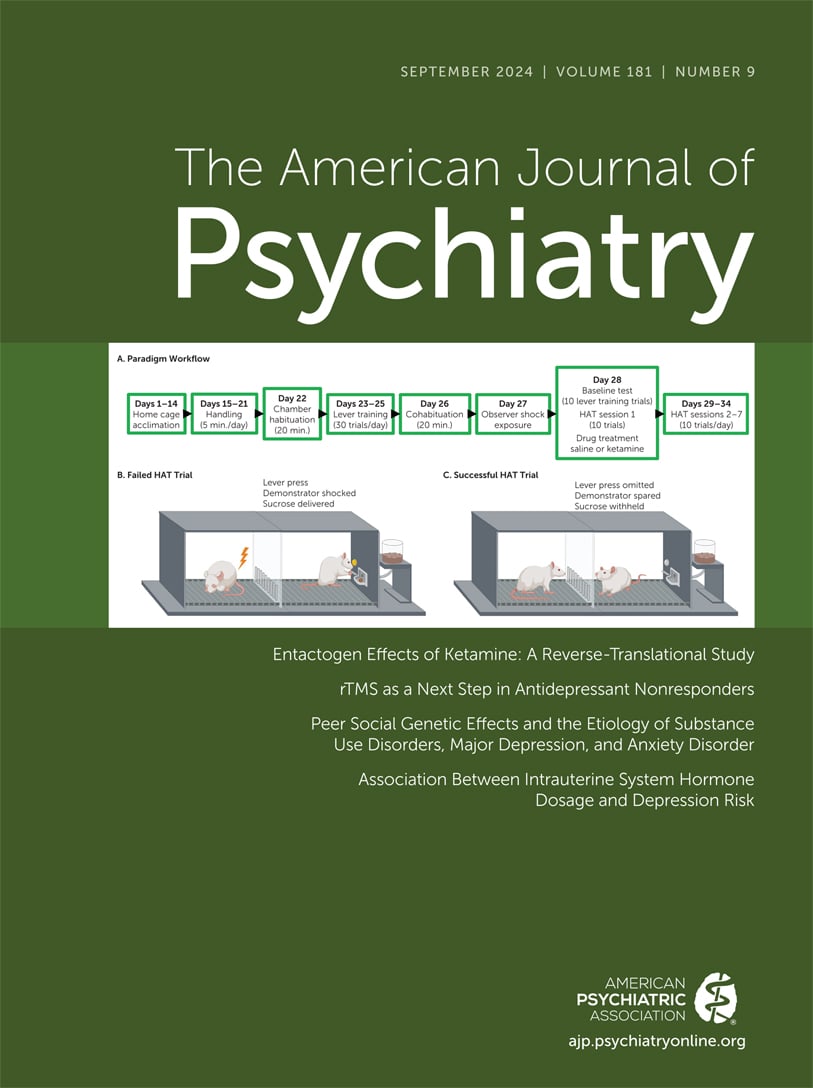American Journal of Psychiatry
- Volume 146
- Number 1
- January 1989
Article
Publication date: 01 January 1989
Pages10–19During the evolution of the primate CNS, organization of neural activity has been shaped by the need for rapid and accurate evaluation of the motivations of others. Using a broad biological approach, the author considers empathy from evolutionary, ...
https://doi.org/10.1176/ajp.146.1.10Publication date: 01 January 1989
Pages20–28On July 26, 1985, an ad hoc committee appointed by the APA Work Group to Revise DSM-III met and reviewed the research on the validity of the DSM-III criteria for melancholia. In this paper the proceedings of the meeting are related. After reviewing ...
https://doi.org/10.1176/ajp.146.1.20Publication date: 01 January 1989
Pages29–34The authors reviewed the literature on the factors influencing the development of psychiatrist-executives. The results indicate that personality traits, clinical psychiatry training, training in administration, mentors, and administrative experience have ...
https://doi.org/10.1176/ajp.146.1.29Publication date: 01 January 1989
Pages35–39The authors conducted a survey of psychiatric education in alcoholism and drug abuse in the United States. Ninety-seven percent of 106 undergraduate training programs and 91% of 169 residency programs offered curriculum units in this field. Most of these ...
https://doi.org/10.1176/ajp.146.1.35Publication date: 01 January 1989
Pages40–44The authors describe 10 patients who developed panic attacks only after substantial cocaine use. The timing of the onset of symptoms, i.e., after 1-6 years of cocaine use, and the fact that only one patient had a first-degree relative with panic disorder ...
https://doi.org/10.1176/ajp.146.1.40Publication date: 01 January 1989
Pages45–49The authors divided 61 subjects with primary degenerative dementia of the Alzheimer's type into a group who also met DSM-III criteria for depression (N = 28) and a group who did not (N = 33). Both groups were randomly assigned to an 8-week double-blind ...
https://doi.org/10.1176/ajp.146.1.45Publication date: 01 January 1989
Pages50–55Dysfunctional interactions between mothers with major affective disorders and their children may contribute to the children's high risk of disorder. This study investigated the behavior of mothers with recurrent unipolar depression, bipolar disorder, or ...
https://doi.org/10.1176/ajp.146.1.50Publication date: 01 January 1989
Pages56–60Eighty-nine smokers were randomly assigned to four nicotine gum treatments for smoking cessation: behavioral treatment plus a fixed schedule of nicotine gum, behavioral treatment plus an ad lib schedule, education plus a fixed schedule, and education plus ...
https://doi.org/10.1176/ajp.146.1.56Publication date: 01 January 1989
Pages61–66This study compared the etiologically significant stressors listed on DSM-III axis IV (severity of psychosocial stressors) with life events elicited by the Psychiatric Epidemiology Research Interview (PERI). Multiaxial evaluations of a diagnostically ...
https://doi.org/10.1176/ajp.146.1.61Publication date: 01 January 1989
Pages67–72The authors studied the religious beliefs, practices, and experiences of 52 psychiatric inpatients. The rate of belief in the major tenets of faith (God, the Devil, and an afterlife) was uniformly high and in accord with national and local public poll ...
https://doi.org/10.1176/ajp.146.1.67Publication date: 01 January 1989
Pages73–76Inpatient units in academic departments are typically directed by junior faculty members, who quickly abandon these positions for less demanding, more rewarding jobs. These frequent turnovers in the directorship compromise the clinical, research, and ...
https://doi.org/10.1176/ajp.146.1.73Publication date: 01 January 1989
Pages77–80The authors describe the first five patients enrolled in an open clinical trial of clonazepam as a maintenance treatment in lithium- refractory bipolar disorder. All patients relapsed quickly after taking clonazepam (one within 2 weeks and four within 10-...
https://doi.org/10.1176/ajp.146.1.77Publication date: 01 January 1989
Pages81–83Three patients with affective disorders with psychotic features were refractory to various combinations of psychotropic agents (antipsychotics, antidepressants, and lithium). Closer scrutiny revealed a seizure history in two patients and unusual ...
https://doi.org/10.1176/ajp.146.1.81Publication date: 01 January 1989
Pages84–87The nephrotic syndrome is a rare, idiosyncratic adverse renal effect of lithium that can occur with therapeutic plasma lithium levels. The syndrome is usually reversed by discontinuation of lithium treatment but may require corticosteroids. Renal biopsies ...
https://doi.org/10.1176/ajp.146.1.84Publication date: 01 January 1989
Pages88–91The authors compared the medical records of 20 randomly selected schizophrenic patients who were receiving fluphenazine decanoate with the records of 20 other randomly selected schizophrenic patients who were receiving oral medications only. The ...
https://doi.org/10.1176/ajp.146.1.88Publication date: 01 January 1989
Pages92–95Patients with panic disorder (N = 11) and age- and sex-matched normal control subjects (N = 11) were challenged with human growth hormone- releasing factor (GH-RF) (1 microgram/kg i.v.) or placebo in random order. The control subjects had significantly ...
https://doi.org/10.1176/ajp.146.1.92Publication date: 01 January 1989
Pages96–98The authors report on a nationwide survey of psychiatric residency training directors who responded to a questionnaire designed to elicit information on the magnitude of the problem of unacceptable performance by residents. One hundred six program ...
https://doi.org/10.1176/ajp.146.1.96Publication date: 01 January 1989
Pages99–101Twelve chronic schizophrenic patients and 12 normal control subjects underwent magnetic resonance imaging of the brain. The schizophrenic patients had a significantly smaller corpus callosum area and higher ventricle-brain ratio than the control subjects.
https://doi.org/10.1176/ajp.146.1.99Publication date: 01 January 1989
Pages102–103According to Feighner criteria, alcohol abuse was significantly more common among 17 schizophrenic male inpatients with self-induced water intoxication than among 17 matched schizophrenic control inpatients. The alcohol abuse had begun 8-22 years before ...
https://doi.org/10.1176/ajp.146.1.102Publication date: 01 January 1989
Pages104–106Residents given a specialized 4-hour course in managing extrapyramidal syndromes prescribed significantly lower neuroleptic doses and were more skilled at diagnosis of extrapyramidal syndromes than residents given standard psychopharmacology training. The ...
https://doi.org/10.1176/ajp.146.1.104Article
Article
Article
Article
Article
Article
Article
Past Issues
View Issues Archive
Vol. 181 | No. 12

Vol. 181 | No. 11

Vol. 181 | No. 10
